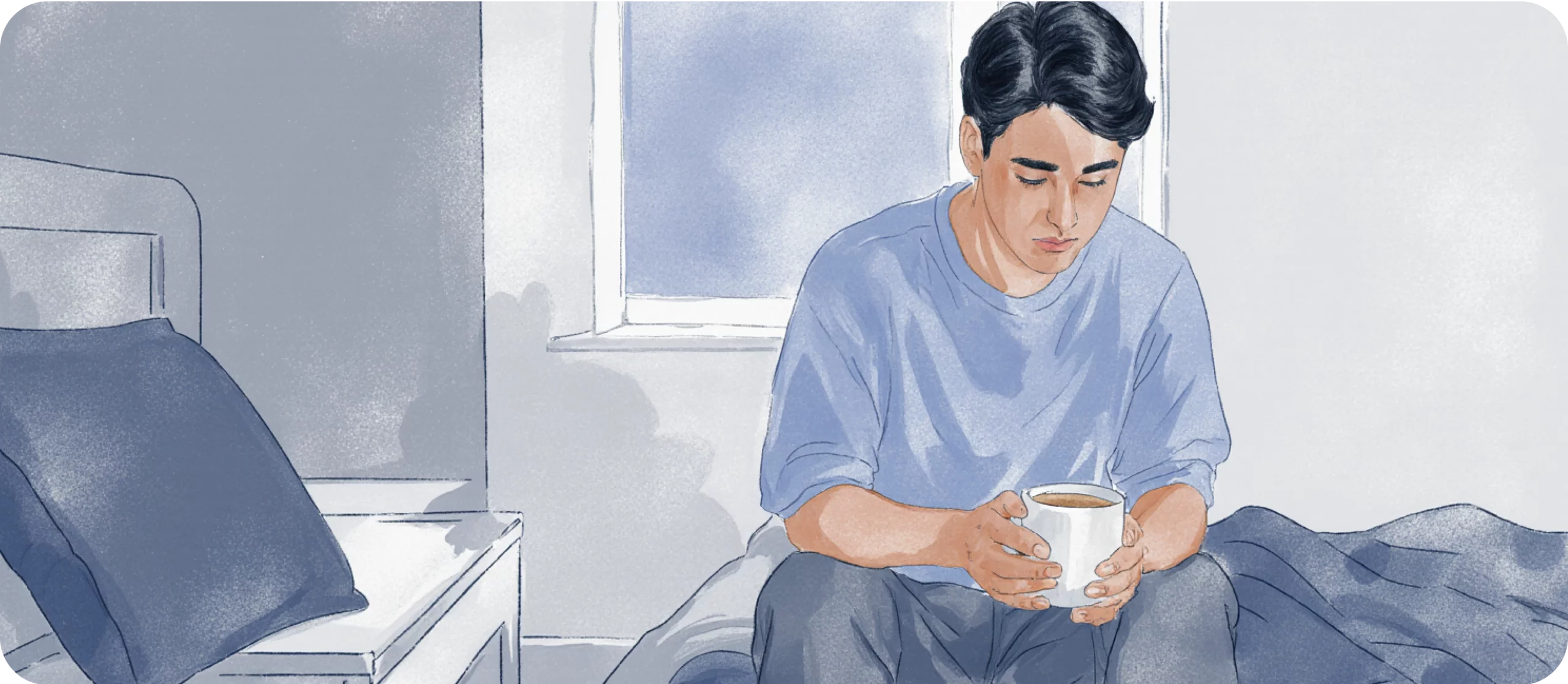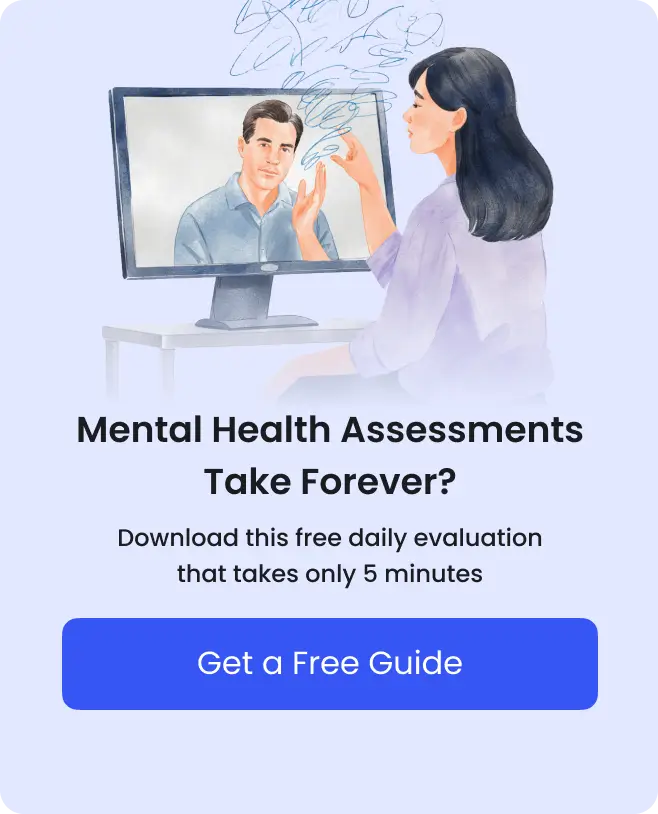Are you constantly feeling bad about yourself, tired, or isolated? Although anyone can experience these emotions, they may sometimes signal mental health conditions, like depression. Researchers estimated that 1 in 3 women and 1 in 5 men will experience major depression in their lives [1].
That’s why we offer you this depression test based on Beck’s depression inventory, to help you reflect on your mood, thoughts, and daily habits over the last few weeks [2].
If you think your past experiences may affect you in daily life, start by taking a free Childhood Trauma Test. It helps identify unresolved childhood stressors like neglect, abuse, or betrayal that may influence your mood and mental health.
Online Depression Test
Each question of this online depression test asks how you’ve been feeling for the last few weeks and has three options (A, B, C). Pick the one option that most closely describes your experience.
Remember, this depression test is only a guideline and should not be used as a diagnostic and statistical manual. Only a mental health professional can give you a full assessment, diagnose clinical depression, and help you find ways to feel better.
1. Have you experienced any significant changes in your mood in the last few weeks?
- A. No
- B. Maybe
- C. Yes
2. During the last couple of weeks, have you found it hard to enjoy things you usually like?
- A. No
- B. Maybe
- C. Yes
3. Have you been feeling more anxious than usual in the last few weeks or months?
- A. No
- B. Maybe
- C. Yes
4. In the past few weeks, have you found it hard to connect with or make sense of your emotions?
- A. No
- B. Maybe
- C. Yes
5. Have you been feeling more tired or low on energy in the last few weeks?
- A. No
- B. Maybe
- C. Yes
6. Have you found yourself getting irritated or frustrated often this month?
- A. No
- B. Maybe
- C. Yes
7. Have you felt unmotivated or found it hard to finish things lately over the last few weeks?
- A. No
- B. Maybe
- C. Yes
8. Have you felt distant from yourself or the people around you within the past two to three weeks?
- A. No
- B. Maybe
- C. Yes
9. Have you noticed your concentration getting worse over the past several weeks?
- A. No
- B. Maybe
- C. Yes
10. Over recent weeks, have small decisions felt more difficult than usual?
- A. No
- B. Maybe
- C. Yes
11. Have you seen any changes in your usual sleep patterns in recent weeks?
- A. No
- B. Maybe
- C. Yes
12. Have you seen significant changes in your appetite or weight in the last month?
- A. No
- B. Maybe
- C. Yes
13. Have you noticed it’s much harder to manage your emotions over the past couple of weeks?
- A. No
- B. Maybe
- C. Yes
14. In recent weeks, have you noticed changes in how you see yourself, struggling with lower self-esteem or self-worth?
- A. No
- B. Maybe
- C. Yes
15. During the last few weeks, have you found it hard to believe things will get better?
- A. No
- B. Maybe
- C. Yes
16. Over the past two weeks, have you had thoughts of self-harm or suicidal thoughts?
- A. No
- B. Maybe
- C. Yes
17. During the last few weeks, have you had thoughts that life isn’t worth living?
- A. No
- B. Maybe
- C. Yes
18. In recent weeks, have you noticed an increase in unexplained physical aches or pains?
- A. No
- B. Maybe
- C. Yes

Depression Test Results
Mostly A’s: Low Likelihood of Depression
You are in a good mood and emotionally stable. While it’s normal to feel sad sometimes or have moments of stress, you likely know how to regulate your nervous system.
Possible characteristics of this state:
- You typically like the hobbies and activities you do.
- You have the energy to finish your everyday tasks.
- Sleep and appetite are mostly stable.
- You know how to feel your feelings.
- You know how to calm down when stressed and can handle decision-making and social interactions.
Breeze tips
- Maintain healthy habits, such as getting good sleep, eating a balanced diet, exercising regularly, and staying connected with others. You may use Breeze personalized routine plans and set up goals to be the best version of yourself.
- Use mindfulness activities in the app, like mindful breathing, or customize daily affirmations to boost confidence, reduce stress, and clear your mind.
Mostly B’s: Mild to Moderate Symptoms of Depression
Your responses indicate some signs of depression that may affect your mood, motivation, or energy levels. These symptoms may be moderate, but paying attention now can help prevent them from worsening.
Possible symptoms you may be experiencing:
- You sometimes feel sad for no reason.
- You may struggle to start or finish tasks, wondering how to get motivated.
- Sometimes you may think, “Why can’t I focus on simple tasks?”
- Low energy level even after rest.
- Sometimes it’s hard for you to fall asleep or stay asleep.
- You sometimes wonder how to control your emotions better.
- You may feel worthless and experience self-criticism.
- You feel hopeless when you think about the future.
- Avoidance of interactions with people.
Breeze tips
Firstly, consider a professional evaluation. A therapist may assess your situation, offer guidance, and help you find the right support or treatment.
In addition to professional support, you can use the Breeze app to track your daily emotions using a mood tracker and mood notes and monitor improvements over time. Breeze also offers other helpful tests to explore burnout, social anxiety, and childhood-related emotional baggage, giving you a better understanding of your mental health.
Start by taking the Childhood Trauma Test for valuable insights and informative discussions with a mental health professional. Use the results as a starting point to reflect, heal, and take actionable steps towards better mental well-being.
Mostly C’s: Significant Signs of Depression
Your depression test results show possible depression that could be impacting how you feel and function in daily life.
Possible symptoms you may be experiencing:
- Persistent sadness, hopelessness, and thoughts like “Why do I feel empty or sad?” most of the time.
- Isolation from friends and family, or difficulty maintaining relationships. You may wonder, “Why do I push people away?”
- You often feel overwhelmed, thinking, “Why am I so emotional?” or unable to regulate your emotions.
- Physical pain or discomfort, even when you’re not sick.
- You often get caught in a shame spiral, thinking, “Why do I feel guilty all the time?”
- Feeling of emotional numbness and thinking, “Why can’t I cry?”
- Loss of interest or pleasure in almost all activities.
- You may feel frustration, wondering, “Why am I always angry and irritated for no reason?“
- Changes in appetite or significant weight loss/gain.
- You lack the motivation to do even simple things and have thoughts like, “Why am I so unmotivated?“
- Significant sleep disturbances, such as insomnia or excessive sleeping.
- You feel exhausted almost every day and sometimes think, “Why do I wake up tired?”.
Expert Insight
If you feel hopeless most of the time and are struggling to function in daily life, it could be a sign that your depression is worsening and requires urgent help. The most urgent red flags are thoughts of wanting to die or believing others would be better off without you—these signal the need to reach out for immediate support from a crisis line, trusted person, or emergency services. If you notice these signs in yourself, it’s a strong indication that you don’t have to carry this alone and that professional help is needed right away.
Rychel Johnson
Mental health professional
Think You Might Be Experiencing Depression?
Depression is a mental health condition characterized by persistent feelings of sadness, emptiness, or hopelessness, along with changes in thoughts, behavior, and daily functioning. Unlike temporary low moods, depression is persistent and overwhelming, often lasting weeks, months, or even years if untreated.
About 280 million people around the world have depression, making it one of the main causes of disability, according to the World Health Organization [3]. Because depression affects multiple aspects of life, it can significantly interfere with relationships, work, school, and overall quality of life.
If your depression test results indicate that you may have symptoms of clinical depression, or if you’re concerned about whether you may have some mental health condition, consider talking to a therapist to get a diagnosis and treatment. You can contact a licensed professional or a crisis hotline [4]:
- U.S.: 988
- UK: Samaritans 116 123
Expert Insight
Depression doesn’t have to define you–it’s possible to build resilience with a foundation of healthy habits. By maintaining regular sleep and exercise routines, nourishing yourself with consistent meals, and practicing stress-management tools like mindfulness or breathing exercises, depression symptoms can be reduced over time. Supportive connections with trusted friends and family, and having meaningful activities or goals, can help create powerful buffers. Think of these resources as ways to strengthen your “emotional muscles,” so that when challenges arise, you have resources to steady yourself and reduce the risk of slipping back into depression.
Rychel Johnson
Mental health professional
Sources
- M. Luppa, C. Sikorski, T. Luck, L. Ehreke, A. Konnopka, B. Wiese, S. Weyerer, H.-H. König, S.G. Riedel-Heller. Age- and gender-specific prevalence of depression in latest-life – Systematic review and meta-analysis.
- American Psychological Association. Beck Depression Inventory (BDI)
- WHO. Depressive disorder (depression). March 2023
- HelpGuide.Org. Are You Feeling Suicidal? How to Cope with Thoughts of Suicide
Disclaimer
This article is for general informative and self-discovery purposes only. It should not replace expert guidance from professionals.
Any action you take in response to the information in this article, whether directly or indirectly, is solely your responsibility and is done at your own risk. Breeze content team and its mental health experts disclaim any liability, loss, or risk, personal, professional, or otherwise, which may result from the use and/or application of any content.
Always consult your doctor or other certified health practitioner with any medical questions or concerns
Breeze articles exclusively cite trusted sources, such as academic research institutions and medical associations, including research and studies from PubMed, ResearchGate, or similar databases. Examine our subject-matter editors and editorial process to see how we verify facts and maintain the accuracy, reliability, and trustworthiness of our material.
Was this article helpful?






